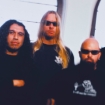"One of the hardest things I ever had to do was say to Jeff, 'Dude, you're not ready to play in Slayer,'" recalls band guitarist and songwriter Kerry King of the last day in 2012 when the late guitarist Jeff Hanneman showed up to practice with the band he helped form.
King wasn't trying to boot his musical companion of 30-plus years. He was practicing tough love, hoping to motivate Hanneman into upping his game and making a more concerted effort to return to form after his battle with necrotizing fasciitis, a deadly flesh-eating bacterial infection. The condition, likely caused by a poisonous spider bite in early 2011, ravaged the guitarist's arm, leaving him unable to play with speed and accuracy. He tried to rehabilitate, but found the process too difficult and sank into a deep depression that he countered with alcohol.
"We kept trying to infuse him back into the mix because he was there from the beginning and we wanted him back," King explains. And while Hanneman was out of commission, Slayer brought in Exodus guitarist Gary Holt as a temporary fill-in since the bands grew up in the 80s thrash scene together. "We told Jeff, 'Y'know, Gary's been doing your gig and Gary don't mess up. If you get out there the way you are now, aside from the façade of people seeing you and being stoked that you're out there, sooner or later they're going to tune in to what you're playing and know that it's not that good.' That was a tough conversation, for sure. Whenever we would rehearse for any given tour, we would always bring Jeff in assuming he was going to be that much better and that much more ready. But he hit a plateau that he never got better from."
Vocalist and bassist Tom Araya, who was closer to Hanneman than King, says Hanneman had been on a decline of alcohol abuse since his dad died during the making of 2009's World Painted Blood. And after he contacted necrotizing fasciitis, he went from beer to booze. "I saw what was happening so I reached out to Jeff and said, 'Just get your ass back on the road. We'll figure everything else out,'" says Araya. "But I think by then he had given up. It must have really been hard for him. Here we are touring without him. We're moving forward. We made him aware of the fact that he was a major part of the band, but he couldn't do what he loved, which was being out in front of an audience and performing."
Meanwhile, the Slayer juggernaut kept rolling with Holt. The only major obstacle before Hanneman's demise came in early March. Four days before Slayer were scheduled to fly to Australia to play the Soundwave festival, drummer Dave Lombardo posted a rant on Facebook in which he complained about being owed significant royalties and touring income. Caught off guard, Slayer held a band meeting—which included Hanneman—and decided to fire Lombardo.
"Dave was getting some very bad advice and he took it," King says with a shrug. "I felt bad for him. At that point, I never planned on playing with another drummer, ever. I don't like to change stuff. I want to roll with how they are. But Dave sent that ship sailing and me and Tom just watched it go."
Araya is less sympathetic. He never forgave Lombardo for leaving the band in a lurch twice before. "I wasn't shocked because we have a history with Dave, and let's just say history tends to repeat itself," he says with a slight sneer. "In all honesty, I knew something was coming. For three or four years we couldn't come to terms with Dave about anything."
When he heard what went down with Lombardo, drummer Paul Bostaph, who had played on a few Slayer studio albums between 1994 and 2000, contacted King and expressed interest in returning to the band. At first Slayer were wary. Like Lombardo, Bostaph had left the band twice before.
"I was actually on the flight to Australia to play Soundwave with drummer Jon Dette, who was already there with Anthrax," King says. "We land. I turn my phone on and the first text is from Paul. I thought, 'Why would I want someone in my band who quit twice?' That said, Paul never left on bad terms and fans like him. He's got his own little niche of fans that are Bostaph freaks so it worked out well."
With Bostaph back in the fold by the spring, Slayer planned to start working on a new album, hoping Hanneman would contribute to the songwriting even if he couldn't play. After all, he wrote the music for many of the band's best tunes, including "Angel of Death," "Raining Blood," "Dead Skin Mask," "South of Heaven," and "War Ensemble." But Slayer's latest album, Repentless, features just one Hanneman song, "Piano Wire," and that was an outtake from 2009's World Painted Blood. The vocals and drums were re-recorded, but everything else is the same.
Even if Hanneman was excited about working on a follow-up to World Painted Blood, he wasn't physically or mentally able to focus enough to write according to his bandmates. "Jeff sent us one song that was made up of a lot of rehashed stuff we had already rejected," King explains. "I think he was having a hard time remembering what it was like to be Jeff Hanneman. And I don't think he realized he was putting together stuff we had already picked through."
King realized the potential predicament Slayer could be in long before Hanneman's downward slide. As soon as the guitarist became ill from the spider bite, King went into riff-writing overdrive and kept tweaking his songs on and off for four years. Hanneman attended band rehearsals, but usually didn't stay for long. Then he stopped coming altogether. Araya reached out to the guitarist with increasing frequency, but Hanneman stopped texting him back. There was radio silence between the guitarist and the band until the spring of 2013 when Hanneman texted Araya to say he had to go back to the hospital.
"I asked him what was going on and he wouldn't tell me," Araya says. "Then I got a text from him saying he was headed home. I was like, 'Cool, this is great. You'll get home, you'll get better and then you'll come back out on the road.'"
But Araya's optimism was short-lived. "The next time I heard about Jeff was from our manager who called to say he passed away," Araya says, his voice a hushed near-monotone. "I thought, 'What? He just texted me and said he was going home.'"
The Slayer co-founder, best recognized as a blur of blond hair standing stage right in an Oakland Raiders jersey, Hanneman lived for Slayer until the day he died on May 2, 2013 from liver failure.
Hanneman never told his bandmates he had cirrhosis of the liver, caused by years of excessive drinking. And the sicker he became, the more he distanced himself from the outside world. "I knew he was in bad shape," King says. "But nobody expected him to die. When he went into the hospital nobody ever said, 'Hey, you better go see Jeff. He doesn't have much time.'"
While Araya was grieving the death of his friend, he did seriously consider quitting Slayer. Not only was he unsure how the band could continue with half of its songwriting team missing, he was furious at the online shit-talkers who took vicious potshots at the remaining band members.
"All these questions went through my head," reveals Araya. "There's no denying that Jeff wrote a lot of the great stuff that Slayer does. Kerry's written some great songs, but I felt that Jeff was a big asset to the band. Everybody knew that, and I felt like we were going to have to prove ourselves to everybody all over again. I didn't know if it was worth the trouble. I was like, 'Gosh, do I really want to move forward with the way these motherfuckers are talking? I don't need this shit.' I've sacrificed and dedicated 33 fucking years of my life to this band."
Had circumstances been different, maybe Slayer would have broken up after Hanneman died. But Holt already had been filling in for Slayer's founding guitarist for years and had been fully embraced by fans. In addition, the songs King wrote were Slayer through and through. In addition to the fast and furious thrash tunes he was known for, King wrote slow, dark, minor-key arpeggios and dense, doomy riffs more reminiscent of Hanneman.
"I actually had the [ringing arpeggio] intro to 'When the Stillness Comes' for 20 years and I was never in a rush to finish it," King says. "I liked it, but I didn't know what I wanted to connect it to, and I knew Jeff always came up with the moody stuff. But now when it was time to come up with different things other than fast thrash I started working on that one and it came out really cool. I was surprised and stoked at the same time that my first attempt at an entire spooky song came out pretty chilling."
With the help of producer Terry Date (Pantera, Soundgraden, Deftones) King and Araya were able to mold the songs into a strong, musically diverse album. In addition, Date helped the stubborn musicians establish a personal stability they've sometimes lacked in the past. "Kerry and I are closer than we had been before, but we still have a lot of communicating to do," Araya confesses. "Being with Kerry, it still wasn't like the relationship me and Jeff had. Jeff would invite me over to his place and we would work out song ideas that he wanted to do. Kerry just gave me songs and had me do them. The first time I do it I try to make it the way he envisions it, then I put my own touch on it and change some parts. And a lot of times he doesn't like that. So with Terry there, if we both liked a part and Kerry thought it should be different, Terry would be like the judge and say, 'Okay, this is good. It stays.'"
"Terry was great, but I gave Tom more breathing room, for sure, "King says. "It was like, 'Hey, it's just you and me now. What do you want to do?' Usually I'd be in there badgering him about his singing because I have ideas for the songs I like, and I want to get them down. But he doesn't like to be on a leash. He only wants a little guidance, then he wants to do his own thing."
It was one day when Slayer were practicing the title track sans lyrics that King came up with the album title. After the final guitar chord and cymbal crash faded away, Bostaph said the song was totally relentless. As a play on words, King said it was repentless, and immediately liked the way that sounded. He also thought the implications of a title fit his idea to turn the song into a tribute to Hanneman that expressed the unconditional love he had for Slayer, but little else. The finished lyrics include lines like: "I hate the life, hate the fame, hate the fuckin' scene/ Pissing match of egos, fuck their vanity."
Araya agrees that King nailed Hanneman's attitude. Even when Slayer became legends of metal, the guitarist felt as misunderstood as ever. "He was always saying we should invest money with someone who could invent teleporters so we could teleport home when we were done with a show," laughs Araya. "And he would tell our manager, 'Can't we just do one show a year in the middle of the country? Everybody could come and we'll play a really long set and then say, 'Okay we'll see you all next year.'"
In addition to including "Piano Wire," Slayer finished a yet-untitled song Hanneman started writing in the mid-90s. "If it comes out on the next record people will say, 'Yeah, Jeff wrote that one,'" King says. "Other than that, there are little odds and ends that Jeff did. There might things that we can Frankenstein together, but it's too early to make decisions like that."
While Araya tweaked some of King's lyrics, the only track he wrote himself was the closer, "Pride in Prejudice." The moody, downtuned number addresses authority figures who abuse their power. "I first got the idea to write a song about racial injustice from the Rodney King episode," Araya says. That 1991 case involved a severe police beating that followed a high-speed chase caught on film. After a highly publicized trial, the officers who beat King were found not guilty, igniting the legendary L.A. riots in April, 1992. Inspired by the more recent events between police and the public in Ferguson, Missouri and Staten Island, New York, Araya decided to revisit the song. "It was really exciting for me when that came together," Araya says. "At first, it wasn't working and then I came up with the phrase 'Pride in prejudice' and everything fit into place. I understood where Kerry was coming from when he added specific lines about what happened in Ferguson, Missouri to the song. He was giving it a date, which made it more current. But to me, the song was current even without the date because race relations in America are always going to be an issue."
Meanwhile, Holt was too busy writing the latest Exodus album, Blood In, Blood Out, to work with King and Araya for an extended period of time on new Slayer songs. Having flown in for only a day, Holt says he did nine solos. "By that time I had blown my left wrist out," explains the axman. "I was getting some kind of tendonitis pain that I wasn't familiar with. I kept shaking it off, and then the next day I couldn't move my hand."
"I wanted to include Gary because I felt the guitar leads should have different voices," King explains. "But I also wanted Gary to feel like he was a part of the process. And in the future, I'm totally open to Gary writing for Slayer. I think about it all the time. He writes great riffs and collaboration between the two of us could be really amazing. I just wanted to get this one under our belt first."
Holt had no problem sitting on the sidelines during the songwriting process for Repentless. The real task for the Exodus veteran has been keeping the band he has shaped since Metallica's Kirk Hammett left in 1983 going full-tilt while holding down the fort in Slayer. As far as problems go, it's a great one to have, but that doesn't make scheduling any easier.
"I came into this situation with Slayer in 2011 planning to help out, and lo and behold, through the ultimate tragedy with Jeff I'm still playing," Holt says. "So I go out and give it my all every night. But it's incredibly difficult to balance the two. Right now, My Exodus stunt double, Kragen Lum from Heathen, is out in Europe with them and I'm here, which kind of sucks. I'll never deny them the right to tour and if I can't be there with them every show, they have every blessing from me to continue without me. I ain't never gonna short-sell either band. And if I complain about playing with two of the most legendary bands in thrash, someone should slap me silly."
And despite the juggling act, Holt had no idea how much Hanneman respected his playing until his widow Kathy read a statement at his wake. "She said Jeff was quite concerned with someone else playing his parts. And then when she told him it was going to be me, he smiled and said, 'Fuck, yeah!'" recalls Holt. "That's the highest compliment and most humbling thing you could ever hear."
It's impossible to guess how different Repentless would have sounded if Hanneman had been at full strength for the album. And it's not fair for naysayers to claim it's not a true Slayer record—that would be like saying Back in Black isn't a real AC/DC album or Black Gives Way to Blue isn't Alice in Chains. Not only does Repentless sound like Slayer, but King captured all the elements Slayer have become known for—minor key chord progressions, doomy riffs, blood pressure-raising blasts of speed, and unhinged leads. Would Hanneman approve? Again, there's no way to know for sure, but King says his late, great bandmate already gave his tacit approval.
"I know he heard 'Implode' and probably a handful of other stuff I was working on," King says. "He never said anything about it, and when you're talking about Jeff, nothing said usually means, 'That's awesome!'"
"And I think he would have been impressed and surprised," Araya concludes. "I know Jeff would have liked what we did because it's Slayer."












